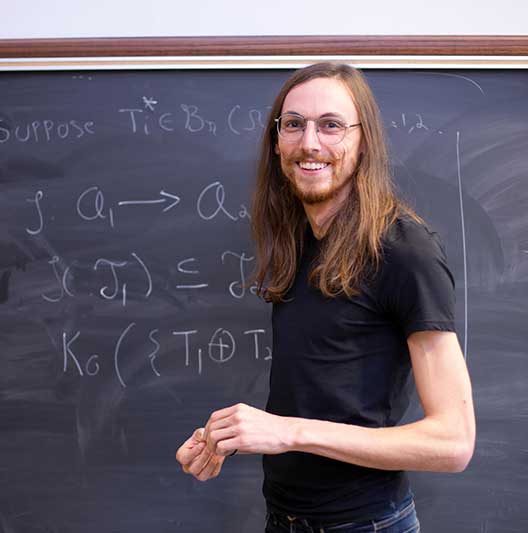Meet a Participant: Derek DeSantis

While participating in the National Science Foundation’s (NSF) Mathematical Sciences Graduate Internship (MSGI) program, Derek DeSantis gained his first experience with applied research when he helped to design a climate prediction model that could quantify environmental changes.
Photo Courtesy of Derek DeSantis
Models from Math: Using Mathematics to Predict Climate Changes
Derek DeSantis never saw himself pursuing a career in mathematics. In fact, he never pictured himself attending college at all. Fortunately, California State University had opened a new campus near his home and was seeking students to fill enrollment, and DeSantis was convinced by his high school teachers to apply. He was quickly accepted, and decided to give it a shot.
At first, DeSantis didn’t know what he would major in. He decided on mathematics during his freshman year because it garnered little interest from other students, yet seemed vitally important. Despite some initial misgivings, DeSantis truly began to love mathematics after becoming involved in undergraduate research during his sophomore year. In particular, he became fascinated with academic mathematics, rather than applied mathematics. After working on several research projects, he progressed on to a doctoral program studying operator algebras and operator theory.
DeSantis heard about the National Science Foundation’s (NSF) Mathematical Sciences Graduate Internship (MSGI) Program through a departmental email, and he decided to apply because he was interested in conducting research at a national laboratory and gaining experience studying applied mathematics. He was accepted and began his program with the Fluid Dynamics and Solid Mechanics group at Los Alamos National Laboratory.
The National Science Foundation’s (NSF) Mathematical Sciences Graduate Internship (MSGI) Program provides research opportunities for mathematical sciences doctoral students; allowing them to participate in internships at national laboratories, industries and other facilities. NSF MSGI seeks to provide hands-on experience for the use of mathematics in a nonacademic setting.
During his internship, DeSantis and his mentor, Phillip Wolfram, focused on researching and designing a new, data-driven climate model, specifically one that could supplement the existing Kӧppen-Giegger model. By being data driven, their model is better suited to account for climate change and other variables. In addition to considering climate change, the pair sought a model that could handle ocean climate data, as this ability is vitally important to future studies on the oceanic effects of climate fluctuations.
By developing new skills, such as programming machine-learning algorithms, DeSantis researched ways to produce a mathematically robust method for climate biome clustering. His researched flagged regions that have experienced recent environmental changes and focused on those changes during different spans of time (e.g. 1950-1970 and 1990-2010). By having data from one biome throughout different time periods, the modeling algorithm can make comparisons of the changes that occurred in those periods. Future use of this model would allow for the analysis of new data, thereby making it easier for predictions to be made concerning future climate and environmental changes.
The practical and applied nature of the internship was a new experience for DeSantis, who had previously only been involved in purely academic research.
“The research was interesting, engaging, fun, and had a sense of purpose. It allowed me to build new skills that were transferable to other career paths and problems I am interested in.” DeSantis says.
He recommends the NSF MSGI program to students who desire the chance to conduct research at a national lab and build professional connections. Specifically, he says the program is a good pathway for mathematicians to explore non-academic career options.
As for his current and future career goals, DeSantis says that he hopes to continue researching not only climate science, but also methods to understand and mitigate the effects of climate change. He has since accepted a postdoctoral appointment at Los Alamos National Labs, where he will be developing a machine-learning model to better understand ocean data.
The NSF MSGI Program is funded by NSF and administered through the U.S. Department of Energy’s (DOE) Oak Ridge Institute for Science and Education (ORISE). ORISE is managed for DOE by ORAU.


